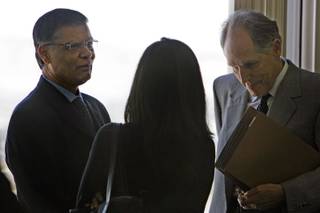Saturday, Oct. 24, 2009 | 2 a.m.
Sun Archives
- Hepatitis case has escalating side battle (10-22-2009)
- Endoscopy plaintiffs target drug suppliers (10-13-2009)
- Desai says he didn't see or approve settlement (10-2-2009)
- Desai, ex-patient settle but other defendants remain in lawsuit (9-26-2009)
- Judge to decide on confidentiality order status (5-9-2009)
- Depositions kept from public gaze in hepatitis cases (7-31-2009)
- Desai, colleagues may take the Fifth, stalling lawsuits for years (5-14-2008)
- Clinic patients' choice: Recourse or privacy (5-10-2008)
- A push for open outbreak litigation (4-8-2009)
- Deadline spurs endoscopy lawsuits (2-28-2009)
Sun Topics
The public could soon learn a lot more about how last year’s hepatitis C outbreak occurred and health authorities’ role in it.
After a hearing this week, District Judge Allan Earl ruled that key records and the answers that witnesses and defendants gave to questions under oath must be made public as some of the cases move to trial. The records and depositions had been kept secret for the past 18 months.
Robert Cottle, the plaintiffs lawyer who persuaded Earl to make his decision Thursday, hailed it as the “biggest day” yet for about 300 former patients who allege they were infected with the potentially deadly hepatitis C virus at three clinics owned by Dr. Dipak Desai.
But Cottle said it was also a big day for the public because he expects these documents will highlight how little government oversight there was of the clinics before the outbreak.
“The public will discover that the clinics did not have any on-site inspections with any regularity other than every four to six years,” he said. “The depositions will show that the government isn’t putting enough effort into protecting the quality of the health care we receive.”
Cottle estimated that about 20 sworn depositions will have to be made public under Earl’s order. The depositions include those of several defendants, including doctors and nurses who did not take the Fifth Amendment. Depositions of witnesses such as pharmaceutical company employees and county and state health officials will also be released.
Plaintiffs lawyers think the depositions contain plenty of information — especially from county and state health officials — that will shed new light on the hepatitis C outbreak.
There are catches to Earl’s lifting of the confidentiality order — the documents won’t immediately be disclosed, and lawyers for the clinics and others involved in the litigation have 45 days to lodge objections to the release of any documents.
Attorneys for Brian Labus, the Southern Nevada Health District’s senior epidemiologist, and Dr. Lawrence Sands, the county’s chief health officer, have asked the Nevada Supreme Court to keep their depositions secret, arguing that as investigators they have a right under state law not to disclose their testimony. The Health District has yet to release a report of its own investigation into the hepatitis scare.
If the Supreme Court orders the depositions of Labus and Sands to remain confidential, it would override Earl’s ruling.
Cottle said a series of reports on inspections done last year by the then-Nevada Bureau of Licensure and Certification would have to be disclosed under Earl’s order. Those reports allege that Desai’s clinics were dispensing multiple doses out of vials of propofol, an anesthetic the clinics used in routine colonoscopies and other medical procedures.
Cottle said the public will be able to determine from the reports “how easily large vials of propofol can be abused and how the risks can be spread among the patients.”
Among the documents Earl deemed public are about 5,000 pages of financial records of the clinics previously turned over to plaintiffs lawyers. Included in the records are 18 months of pages from the general ledger, from early 2007 to mid-2008, showing all the money going in and out of the clinics, Cottle said.
“These records tell us the financial story of the clinics and will provide a basis to show the greed that was rampant there — the cutting of corners and cost containment and the reusing of vials and flushing fluids,” Cottle alleged.
Cottle and the other plaintiffs lawyers are operating under the theory that the infections occurred because the clinics squeezed multiple doses out of vials of propofol.
Other records could help the plaintiffs establish that the clinics were buying larger than normal vials of propofol and that they were shipped to the clinics with little or no reminders to physicians and nurses that the drug was to be used in single doses only, Cottle said.
The plaintiffs also expect to benefit from still other records Earl ordered turned over. Those are records of the “source patients,” hepatitis C carriers whose blood infected the propofol.
Although Earl ordered the identities of the source patients to remain confidential, other information in the records, such as the times those patients were treated and what size vials of propofol were used during their procedures, will provide the plaintiffs with crucial evidence they hope will prove their cases.
“It’s a shame that it took us 18 months to get these records,” said Ed Bernstein, another plaintiffs lawyer. “In any other case it would have been automatic to get these documents at the beginning of the case.”


Join the Discussion:
Check this out for a full explanation of our conversion to the LiveFyre commenting system and instructions on how to sign up for an account.
Full comments policy